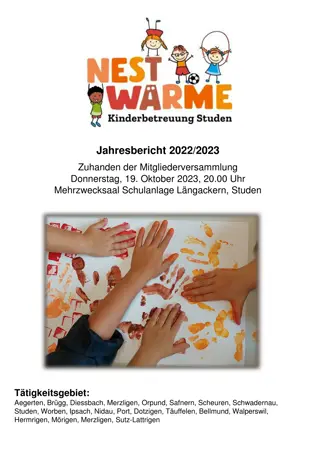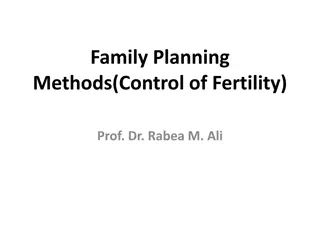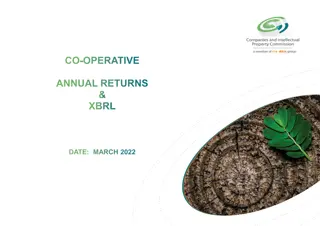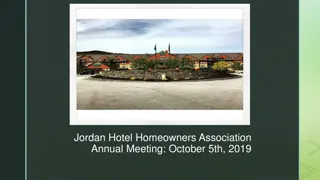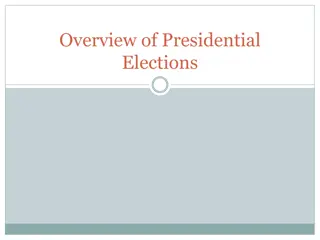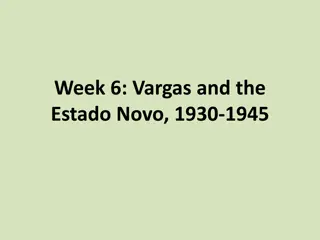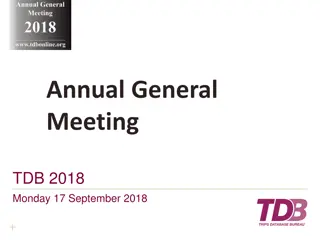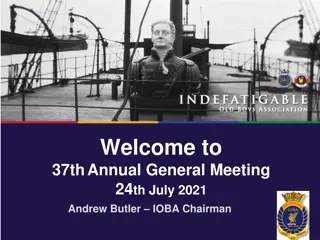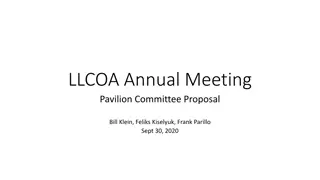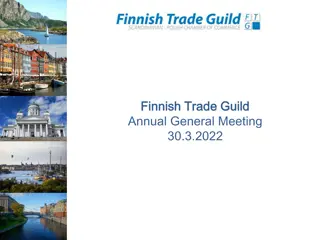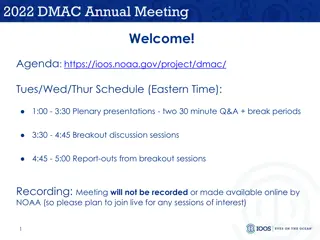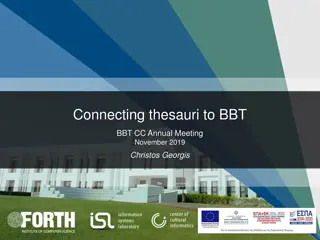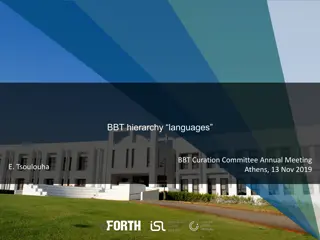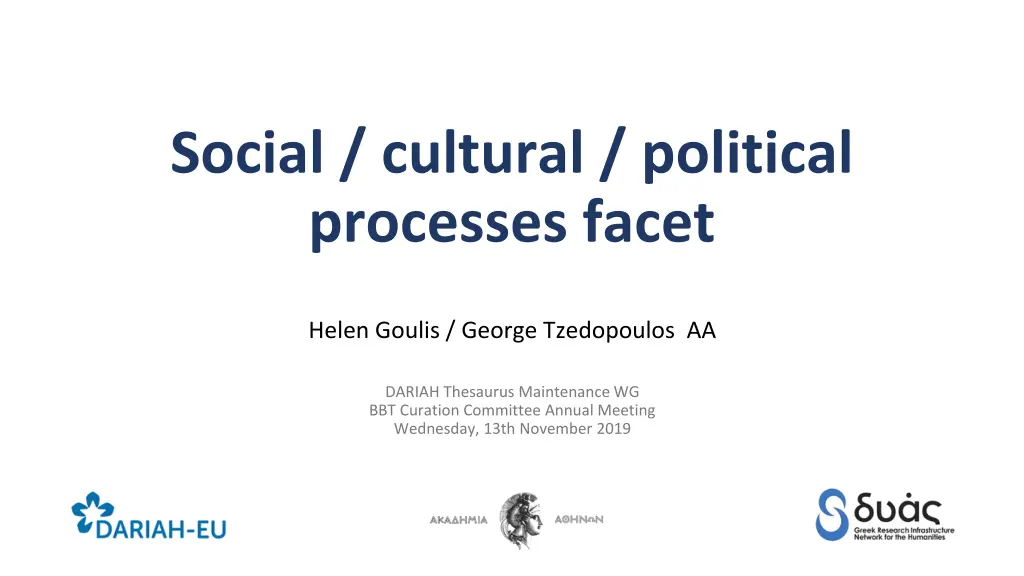
Social Cultural Political Processes Analysis
Explore the facets of social, cultural, and political processes as discussed in the BBT Curation Committee meeting. Topics include differentiation of social processes, temporal aspects, and examples like globalisation and radicalisation. Dive into the complexities of these interconnected human dynamics.
Uploaded on | 1 Views
Download Presentation

Please find below an Image/Link to download the presentation.
The content on the website is provided AS IS for your information and personal use only. It may not be sold, licensed, or shared on other websites without obtaining consent from the author. If you encounter any issues during the download, it is possible that the publisher has removed the file from their server.
You are allowed to download the files provided on this website for personal or commercial use, subject to the condition that they are used lawfully. All files are the property of their respective owners.
The content on the website is provided AS IS for your information and personal use only. It may not be sold, licensed, or shared on other websites without obtaining consent from the author.
E N D
Presentation Transcript
Social / cultural / political processes facet Helen Goulis / George Tzedopoulos AA DARIAH Thesaurus Maintenance WG BBT Curation Committee Annual Meeting Wednesday, 13th November 2019
Discussion via BBTalk Proposition of two new terms called Processes and Sociopolitical processes with the suggestion that the first ( Processes ) could function as a new facet with two hierarchies: Sociopolitical processes and Natural processes , until then a separate facet. The proposal has been discussed and finally withdrawn. However, it has been noted that we should return to the discussion on social processes. The main issues that have been brought forth in the former discussion were: a. how to distinguish social processes from other terms corresponding to temporal entities (or concepts of changing in time), and b. how to accommodate -if possible- social processes in the facet Activities , given that the scope note of the latter emphasises the factor of intentionality, while not all of the actions taking place in processes over sometimes a long period of time can be said to be pointed at one aim that had to be achieved .
Scopes of the presentation to elaborate on the temporal aspects of processes, which may help us to distinguish them from other entities to explore whether processes can be included in the facet Activities by relativising the notion of intentionality
A social process: Globalisation [ ] globalisation is an open (i.e. not predetermined) process that substantially transforms [ ] such institutions of human collective organizations as states, companies, churches and families (Osterhammel & Petersson, 2005). The process of globalisation has been precipitated by a number of factors, including rapid technology developments [ ], political developments [ ], and transportation developments [ ] (QFINANCE: The Ultimate Resource,2013). [ ] globalisation [is] the process in which more and more people become connected in more different ways across larger distances (Lechner, 2009). [ ] globalisation is not a fundamentally new concept in history but is the latest variant of an inherently globalising political economy (K tting, 2004). Globalisation decisively unmakes the coherence that the modernist project of the nineteenth- and twentieth-century nation-state promised to deliver the neat fit between territory, language, and identity (Su rez-Orozco & Qin-Hilliard, 2004). [ ] globalization refers to the rapidly developing and ever-densening network of interconnections and interdependencies that characterise modern social life (Tomlinson, 1999).
A social process: Radicalisation Radicalisation is a process by which an individual or group comes to adopt increasingly extreme political, social, or religious ideals and aspirations that reject or undermine the status quo or contemporary ideas and expressions of the nation. The outcomes of radicalisation are shaped by the ideas of the society at large; for example, radicalism can originate from a broad social consensus against progressive changes in society or from a broad desire for change in society. Radicalisation can be both violent and nonviolent, although most academic literature focuses on radicalisation into violent extremism. There are multiple pathways that constitute the process of radicalisation, which can be independent but are usually mutually reinforcing .
Types of epochs and Social processes Types of epochs (scope note): This facet comprises types of cultural, social, intellectual phenomena consistent with each other thus creating intelligible unities. [ ] this facet [includes] the abstract concepts by virtue of which it is possible to conceive the cultural, social and intellectual phenomena as coherent . Processes: The most crucial feature of processes is the dynamics of change they bear that results in the making and/or unmaking of sociocultural structures. Whereas for any researcher of the Humanities epochs refer to spatiotemporal units of some structural coherence (e.g. Antiquity , Modernity ) that emphasize continuity, processes are shorter spatiotemporal units of more or less radical change in one or many branches of social and cultural life.
Social/cultural processes Some grand scale processes Hellenisation Confessionalisation Secularisation Industrialisation Colonisation Modernisation Some less generic processes Radicalisation Bureaucratisation Militarisation
Activities Scope note of the facet: This term classifies intentional actions that result in the preservation, creation, production, modification or destruction of an entity (living beings, conceptual/material objects, groups, social, intellectual, physical etc. phenomena) .
Activities SUGGESTION This term classifies intentional activities or human activities not directly attributed to specific volitional agents, being part of complex phenomena evolving on several levels over long-term processes, which result in the preservation, creation, production, modification or destruction conceptual/material objects, groups, social, intellectual, physical etc. phenomena) . of an entity (living beings,
Note in the scope note of the facet Activities Note: It is important to note that actions that are unintentional are excluded from this facet. Such actions may result from natural processes (natural disasters, geneses, changes due to natural causes), the non-conscious actions of subjects (e.g. the actions of people that are under the influence of drugs) as well as coerced actions performed in conditions that deprive persons of their free will. The fundamental criterion for the exclusion of these kinds of actions from the activity facet is the will, the ability of a subject to choose his purpose according to his judgment. Insofar as the will is the criterion for the determination of an action, the notion of purpose is the starting point for building the hierarchies of the activity facet.

